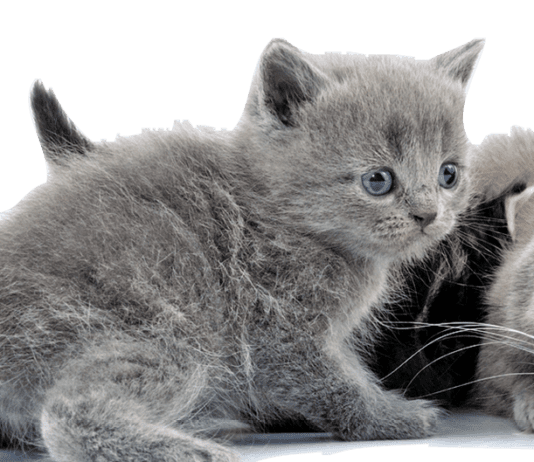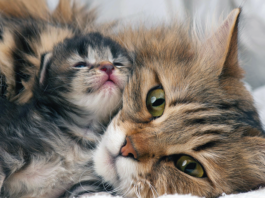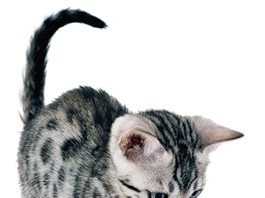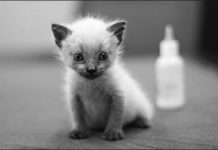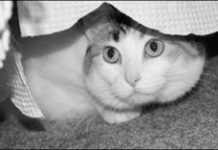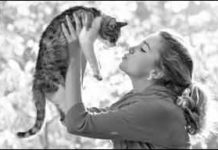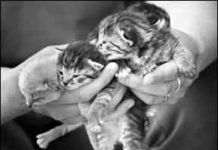Unlike Adults Battling Over Resources, Kittens Learn the Limits of Roughness
As engaging as kittens play fighting is - and hours of YouTube can attest to it - the behavior serves a serious purpose. Thats how kittens learn to stalk, to hunt and how rough to be, or not to be, with people and each other, says animal behaviorist Tracy Kroll, DVM. Kittens learn from each other what hurts.The challenge for owners is determining when to intervene in unbridled chases, leaps and attacks. If one kitten is no longer enjoying the play behavior and is hissing and trying to escape, he wants the game to be over, Dr. Kroll says. With young cats, each has a time limit for games.
Whats Your Cats Age in Human Years?
If there were an AARP for pets, your cat would get his membership card when he turns 8. Thats about 50 years old in human years, according to Feline Life Stage Guidelines from the American Association of Feline Practitioners and American Animal Hospital Association.
A Second Chance for Newborn Kittens
Volunteers at an animal adoption center in Los Angeles are keeping kittens alive with one simple act of kindness. They’re feeding newborns in two-hour shifts around the clock. They view their effort as crucial: Among 13,000 healthy or treatable pets euthanized at Los Angeles City shelters last year, more than 6,000 were neonatal — or newborn — kittens.
‘Stranger Danger’? It’s Genetic
Scout was camped out under the sofa, refusing to eat. The cat’s fearful behavior began when Richard and Sue-Ellen Stillwell Jones’ daughter and her husband came to visit. When they walked into the Fort Collins, Colo., home, Scout looked terrified and disappeared under the sofa. She didn’t emerge for most of the day, and Jones was afraid that the stress of having strangers in the home, combined with her lack of appetite, would cause the cat’s pancreatitis to flare up. Scout’s fear of strangers isn’t uncommon, says Katherine A. Houpt, VMD, Ph.D., behavior specialist and professor emeritus at the Cornell University College of Veterinary Medicine. It’s a natural reaction to people who don’t smell familiar. “It’s not surprising that cats are fearful,” she says.
Ask Elizabeth: September 2013
I understand why you may want to use these devices for cleaning the air with three kitties in the house, and you are certainly not alone in doing this. Although kitties (and their food and waste) smell great to me, households with cats can sometimes generate odors that some people find objectionable, and there are a number of ways that owners choose to deal with this. Ionic air cleaners are one of the newer technologies that have been developed to address air pollutants.
Ask Elizabeth: July 2013
I completely understand your thoughts on this matter, as recent developments have caused many owners (and cats … believe it or not!) to reconsider their habits and the effects that their lifestyle may have on native populations. The recent study suggesting that domestic cats are contributing to the demise of billions of birds and small mammals points out the fact that the interaction of domestic species with native wildlife is an important issue, one that requires careful thought and action.
Short Takes: April 2013
A survey of more than 50,000 U.S. households has uncovered a puzzling disconnect between cat owners’ beliefs and actions. Owners in 2011 said they increasingly consider their cats family members — 56 percent, up from 49.4 percent in 2006. Yet just 27.1 percent of owners say they took their cats to the veterinarian only when they were sick. Given that the feline population in the U.S. is approximately 74.1 million, about 20 million pet cats went without regular checkups and care in 2011.
Ask Elizabeth: September 2012
I work at a large no-kill animal sanctuary with special-needs cats. Often when one becomes ill and stops eating, we tempt him or her with people food like baby food or boiled chicken. I have heard a lot of conflicting things about feeding cats baby food or straight meat. Someone recently told me that a good all-meat baby food and straight chicken are nutritionally complete, but I have read in a few places that cats need other nutrients like taurine and vitamins A and D or they will get very sick. Does straight meat provide full nutrition for cats? In the wild, how do cats get full nutrition if meat does not provide it all? What is the best kind of food for our dear kitties?
A Commitment to Improving Well-being
Imagine veterinarians being able to sterilize feral cats by vaccination instead of surgery. Or to identify the connection between a relatively benign form of feline coronavirus and feline infectious peritonitis, which is nearly always fatal, with the hope of finding ways to diagnose and combat it. Or discover how and why vaccine-associated sarcomas may trigger DNA damage in some cats and how this damage may be used to predict which cases of the sarcomas are amenable to chemotherapy. These are just three of the many scientific studies funded by the Cornell Feline Health Center where, under the guidance of Director Colin Parrish, Ph.D., Professor of Virology, the goal of bettering the health of cats continues to be the focus and commitment, as it has been since the center opened its doors in 1974.
Fostering Kittens: An Important Job
Consider this: One cat and her offspring can produce a whopping 420,000 cats in just seven years. Each year, from April to November, hundreds of thousands of kittens are born — often to feral or stray moms that struggle to survive on our city streets, in the suburbs, and in rural areas across America. Without human intervention, most of these newborns will die or lead short, miserable lives. The moms that are not killed by cars, other animals, or disease, will repeatedly become pregnant, adding to the already crushing pet overpopulation problem.
Ask Elizabeth: March 2012
Female cats in heat can be quite promiscuous and will often mate with more than one male, a survival mechanism designed to increase the chances that mating will result in pregnancy. Studies show cats that mate only once get pregnant just 50 percent of the time. Cats are induced ovulators, meaning that the act of mating triggers egg release or ovulation. When cats ovulate, multiple eggs are usually released. Not all of the eggs are necessarily fertilized following a mating. Unfertilized eggs can be fertilized during a subsequent mating, or the next mating may result in the release of even more eggs which are then available for fertilization.
Ask Elizabeth: January 2012
We adopted a new kitten from a local rescue group last month, and she is just perfect. Although she had been tested for the feline leukemia virus and FIV by the terrific group that saved her from the street, we took her to our veterinarian right away so that she could be examined before we introduced her to our two older cats. After a clean bill of health, we brought Bunny home, and she has become a well-integrated part of the family. The problem is that before we scheduled her spay surgery, she came into heat. What a scene!

